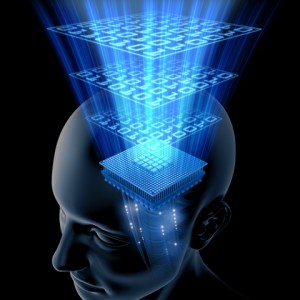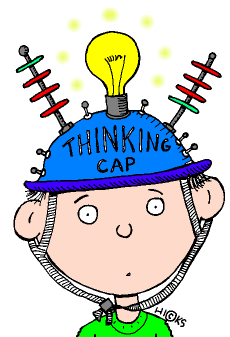As I have posted many times, people think with their brains, not with their minds. That is, while in one's mind one thinks logically, in practice there are all sorts of illogical aspects of any man's thinking. Indeed, I sometimes think that the mind sees it function as imputing rationality to the product of its brains thinking. There is a lot of research which suggests that different parts of the brain work in different "circuits" to produce different ideas and conclusions. Moreover, although the brain can use formal syllogisms to reach logical conclusions and can use mathematical techniques to perform complex calculations, it may also be influenced by emotions or by essentialism (as per the previous posting) to produce less than consistent results. That leads me to thinking a little about how we learn.
First, lets think about explicit knowledge. I know it is about a mile from the house in which I now live to the house in which I once lived. I know that because I have often walked between the two, I know how long it takes to do so, and I know how fast I walk. I also know because I have driven the distance and checked on the odometer of my car. Thus I have learned this piece of explicit information by direct experience, and indeed by use of an (unconventional) measuring instrument. Some science educators feel this discovery method of learning it best. I suspect that there is an advantage in having kids get some discovery experience as they study science, in part to obtain some implicit knowledge and skills relating to discovery (see later discussion).
Discovery is time consuming. I can learn the distance to another location more quickly be asking someone. Indeed, we learn a lot by others telling us. Indeed, I found living in societies in which there is much less printed information, people spend a lot of time talking about where things are to be found. Here we might ask for such information on a need to know basis, but in the past I would have looked up an address in a phone book. Today, I would use the Internet, as the Internet has become a memory aid or extension. Similarly, I recall that in Egypt, college students (at least a few decades ago) did not have much access to books, so they learned by listening to lectures from their professors and taking copious notes which they would later study. American college students at the same time learned much more from the expensive books that they were forced to buy.
There are things that you can not learn by direct experience. Those of you who follow this blog (or who click on the "book review" tag) will see that I read a fair amount of history. Clearly one can not observe the past directly, but books are a good way to learn facts about history, as well as to obtain an understanding of historical processes, and to learn to attach meaning to the historical facts one reads about. So too, however, are videos and other "hotter" media when they present historical information.
Implicit knowledge is sometimes the knowledge that you don't know you know. More accurately, it is knowledge that you have but have not articulated and made explicit. Generally, it is learned through a process of apprenticeship, observation and experience. It may be the knowledge of how to farm that a kid learns from watching and helping his parents on their farm, or that which a craftsman has learned in a formal apprenticeship, or even that which a scientist has learned from working under the guidance and supervision of an experienced scientist. Recall how many Nobel Prize laureates were trained in the labs of earlier Nobel Prize laureates; apparently the understanding of how to select important and tractable research problems and bring the research to fruition is tacit knowledge, obtained by contact with those who already possess it.
Skills I think of as acquired through drill and practice. Yet athletes often have quite explicit knowledge about their skills. Think of golfers who watch videos of their swings and work with coaches who provide explicit advice on how to improve the swing and thus to improve scoring. These professional athletes and their coaches can see much more than you or me even in real time, and many times more than the casual observer when using technology to improve their perception of the skill. Indeed, I suspect that they can identify exercises to strengthen muscles involved in a good swing and others to assure flexibility where that is needed.
If indeed we think with our brains, with all their evolved mechanisms and networks and their complex chemistry, tied to the rest of the body's nerves and chemistry, then we must amplify our concept of learning to consider how the body and brain can be modified (and developed) to produce (on the average, or in critical opportunities) better results of thinking. I suspect that in part we can learn in this way through the arts and humanities, as we come to emulate people (fictitious or real) who think in ways that we perceive as effective. So too, growing up in a nurturing environment with role models who think well, we might learn to emulate their thinking.
We are also social animals, who think collectively. Consider a game between two teams of five year old soccer players; both teams tend to clump around the ball with everyone trying to do the same thing. Compare that with world class adult soccer players who distribute themselves across the field, each playing his/her own roll, with a constantly changing pattern of players over the field as players respond to challenges and take advantage of opportunities while carrying out specific responsibilities. Of course, the adult players have developed their own individual skills, but they have also studied the came, played with and against increasingly better players over a period of years, and received expert coaching, all of which contributed to their learning to play effectively within a team. Considering World Cup teams, while all of the players will have achieved high levels of skills as individual and team players, a team will also participate in joint practice and will get better as the players get more and more experience playing together in the same team.
However, as is very clear, at this level teams get still better by replacing good players with still better players, replacing good coaches with still better coaches. A group of people can improve its performance not only by the individuals learning to perform better as individuals and as a group, but also by adding members with abilities needed by the group, and dropping members whose performance is less than optimal.
Increasingly we use information and communications technology (ICT) with which to amplify our thinking. Learning then has an aspect of improving the technology amplifying our thinking and improving our interface and use of technological aids to thinking. Indeed, as we increase our skill in utilizing ICT, we increase our ability to amplify our thinking by means of ICT. Information and communication technologies amplify human cognitive abilities in a way strictly analogous to the way in which mechanical power and machinery amplify human mechanical abilities. Telephone allows us to communicate at a distance, the cloud allows us to store and recall information with alacrity (and indeed to obtain information stored by others), and the computer allows us to calculate with alacrity.
As suggested above, ICT allows us even to improve our physical skills by improving our ability to observe and analyze our current skill levels and performance, ICT allows us more access to literature (remember e-books), drama, and other sources by which we can improve our emotional learning and the integration of our intellectual and emotional learning.
ICT also allows new modalities of group thinking as well as improvement in the speed and quality of group thinking. Consider the use of communications by teams in such organizations as the Secret Service when it protects the president; consider the use of groupware allowing a team to collaborate in an analysis and its communication.
On both an individual level and a group level, investing in ICT infrastructure, developing ICT skills, and building software and data capacity can therefore be conceptualized as a kind of learning; one can consider trade offs between such investments and investments in human capital through education and team building.
If one considers thinking in this broad framework, I suspect that one will develop new ideas about the role and process of schooling, of non-formal education, and of lifelong learning.




1 comment:
i like this topic. but i am curious about izit creative can be train ?? As you say that think use their brain not mind. i want to ask how can be more creative ? this is the problem recently i face. i want to be more creative and faster thinking and make decision .thanks for your sharing. i really appreciate it .
Best Regards
Express Bus From Singapore To Kuala Lumpur KL
Post a Comment